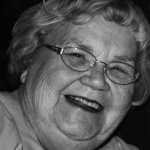By Betty Mills
If there is a common cliché in our lives these days, it is how much our lives have changed. Some of it is just little stuff like not wearing a hat to church or shopping on Sunday. But how about the big picture, that thing called tradition, and in the larger view, culture?
Not the stuff of art museums and lofty lectures on the customs of a people, but on the attributes, the accepted norms, of the daily lives of people like ourselves and the neighbors next door—the time-honored customs of a family, mine and yours, and of the communities in which we live.
My parents were both the children of immigrants—mother’s were Norwegian; my father’s, Swedish. There wasn’t anything particularly Scandinavian about our lives, however, except Christmas, if you count lutefisk. Which I assure you, I did not. They could both speak the language of their respective parents, but they never did in their children’s presence.
My first encounter with someone else’s holiday habits came the first Christmas of my newlywed life, when it turned out that my in-laws observed the English holiday version and did not celebrate on Christmas Eve as my family always did. That night they baked tuna fish casseroles and fought over bridge, and the real celebration was properly observed on Christmas Day. My solution to this cultural dilemma was to celebrate both days.
Admittedly, I had never spent a lot of time meditating on our way of life or its residuals in our current one, until early this summer. I was discussing the disposal of my cat’s ashes with a young friend. She buries hers with a lilac bush as part of a ceremony.
“We never did that when I was growing up,” I said, and she replied, “That’s because you were a farm kid.”
And it dawned on me then that the overriding tradition of my life was not related to my hereditary nationality, but to my rural life.
It was, I had thought, a lifestyle I left when I went to college, got married, lived in a city, and never drove another tractor, pulled cockleburs out of a corn field, or fed a pet lamb. Admittedly, it took awhile to adjust my concept of how the everyday patterns of life should be carried on, starting with the proper time to get up in the morning, who could mow the lawn, and why gardening was more important than learning to play golf.
Maybe it can be a good thing, not being rigidly regulated by the old rules. I spent a hunk of my summer reading time with Jane Austen, the early 19th Century English novelist, who wrote in a time and place when social rules rigidly applied, and women’s live were particularly constrained. If nothing else, reading Jane Austen makes me enormously grateful not to have lived in her time. Or for that matter, in my grandmother’s time, when even in this free wheeling country, women were not allowed to vote.
But perhaps we should be cautious about too much abandonment of the customs and traditions which bind families and communities together, give color and excitement to otherwise ordinary lives, and which hold the generations together.
How do we do that when families become so scattered in this modern world? Perhaps by collecting the stories that reclaim for us yesterday’s memories and restore in another generation the family tradition, if not in actual practice, at least in their understanding.
How else will my great-grandchildren know that I was a farm kid?
 Betty Mills graduated with honors from Mary College in 1967 with a degree in social work. Her career has included motherhood and leadership; Betty served on many local boards and councils.
Betty Mills graduated with honors from Mary College in 1967 with a degree in social work. Her career has included motherhood and leadership; Betty served on many local boards and councils.
